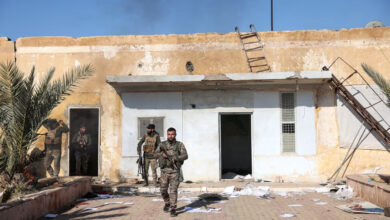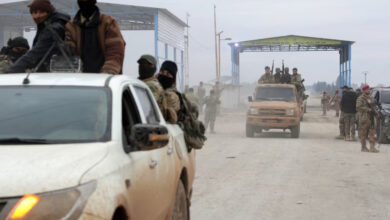Al-Qaeda's front group in Iraq, the Islamic State of Iraq, acknowledged on Tuesday that Al-Nusra Front, a jihadi group fighting Syrian President Bashar al-Assad's regime, was part of its network.
The statement in an audio message posted on jihadi forums was the first confirmation of widespread suspicions among analysts and officials of links between the two groups, both of which are labeled "terrorist" organizations by Washington.
The new organization will be called the Islamic State in Iraq and the Levant and its Syrian branch will be headed by Abu Mohammed al-Jolani, the network's leader Abu Bakr al-Baghdadi said.
Officially, Al-Nusra was established in January 2012, according to a video statement declaring its creation, and shares several commonalities with its Iraqi counterpart.
Both groups have achieved notoriety for their use of suicide attacks and car bombs, as opposed to the more conventional fighting methods of other militant and rebel groups in Iraq and Syria.
Like Al-Qaeda in Iraq, Al-Nusra Front has a substantial portion of foreign fighters among its ranks, including Iraqis, Palestinians and other Arabs. Fighters from central Asia, east Africa and eastern Europe have also joined.
And Baghdadi also confirmed that the Iraqi branch had helped its Syrian counterpart by contributing funds and training, as well as transferring experienced fighters.
According to many analysts, Al-Nusra's current strength is also partially a result of Assad's regime looking the other way as jihadis made their way into Iraq to fight US troops via Syria.
The fighters were using decades-old smuggling routes that became popular during an embargo imposed on Iraq in the 1990s, when many commodities had to be illicitly transported into the country.
Now many are headed back into Syria to fight for jihadi groups such as Al-Nusra.
But, crucially, analysts say that Al-Nusra has also learned from mistakes made by Al-Qaeda in Iraq, in particular by frequently stating that its targets are military and official representatives of Assad's regime, though civilians have often been casualties of the group's attacks.
By contrast, Al-Qaeda in Iraq gained a reputation for its brutality to the civilian population, helping foster animosity towards it and contributing to the trend of Sunni Arab tribal militias that had once fought alongside the group against US forces later siding with American troops.




